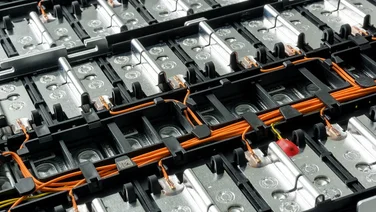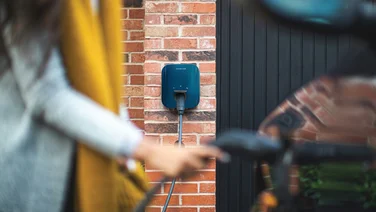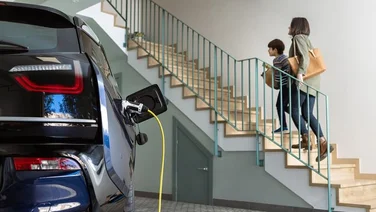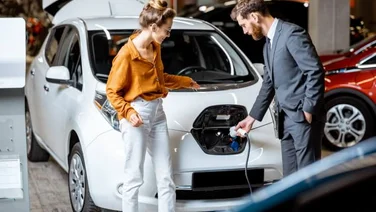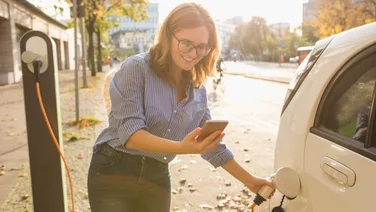We receive a small fee from trusted installers when you request a quote through our site. This helps us keep our content independent, well-researched and up to date – Learn more
- Charging an EV at home will save the average car owner £447 a year
- Flat owners/renters can get a grant of up to £350 to install an EV chargepoint
- Landlords can get grants of up to 75% of the cost of installing chargepoints
The UK government is trying to encourage Brits to switch to electric vehicles (EV) to help the country reach net zero emissions by 2050.
In fact, from 2030, new petrol and diesel cars will be sold, with hybrid cars available until 2035. Therefore, electric cars are the future, and you can save around £447 a year, on average by installing an EV chargepoint at home.
The reality is, though, EV chargepoints are an investment. The good news is there are some grants available, depending on various eligibility requirements.
Read on to determine what chargepoint grants are available, if you’re eligible for one, who each grant is for, and how you can apply for one.

Install an EV chargepoint
If you're looking to install an EV chargepoint, we can help. Use the button below for quotes from our trusted suppliers.
What government grants are available for electric car charging points?
On average, each scheme covers between 60% to 75% of the costs of installing an EV charger. To qualify for most of these, applicants need to have access to off-street parking.
Grant | Region | Who’s eligible |
|---|---|---|
EV Chargepoint Grant | Everywhere in the UK, except the Channel Islands and Isle of Man | Flat owners or renters with off-street parking (learn more below) |
Workplace Charging Scheme | Everywhere in the UK, except the Channel Islands and Isle of Man | Registered businesses, charities, and public sector organisations (learn more below) |
EV chargepoint grants for landlords | Everywhere in the UK, except the Channel Islands and Isle of Man | Landlords with properties in residential areas (learn more below) |
EV Chargepoint Grant
The EV Chargepoint Grant replaced the Electric Vehicle Homecharge Scheme (EVHS) on 1 April 2022. The key difference between the two grants is that the new EV chargepoint grant is only available to people who own flats or renters.
The grant provides up to £350 towards the cost to install an electric car charger. It’s available everywhere in the UK, except the Channel Islands and the Isle of Man.
Who is eligible?
To be eligible for the grant, you need to:
- Own and live in a flat or a rented home (rented includes shared ownership)
- Rent and live in any residential property
- Have price off-street parking
- Own an electric vehicle that’s on the eligible vehicles list
You cannot apply if:
- You live in a house that you own, unless it’s converted into flats and you live in just one of the flats
- You rent accommodation where the landlord or homeowner lives – for example, if you’re a lodger in someone else’s home
- You’re moving or planning on moving
- You’ve already claimed the grant
- You want to replace a chargepoint, even if the existing one is incompatible with your new car
- You want to move an existing chargepoint to a new property
- There must by law be a chargepoint – for example, because your home is a newbuild.
Your parking space must be off-street, private and clearly defined, is accessible to you at all times. You must also own it or have the legal right to the parking space.
Your installer will assess if your parking space allows an EV to charge safely.
How to apply for the EV chargepoint grant
To apply for the grant, you need to contact an EV chargepoint installer that’s on the list of government approved installers. You can use the government’s search tool to find one.
Once you’ve chosen an installer and the type of electric vehicle charger you want, you’ll need to ask them to start a claim for you. Once they’ve submitted it, you’ll receive an email with a link to an online application form for the grant.
If you’re approved for the grant, the installer will charge you the discounted rate on your EV charger installation. Your installer must either complete the work within 90 days of your application being approved or request an extension. Otherwise you will need to submit a new application.
In summary, follow these steps:
- Contact an OZEV-authorised installer to get a quote for the work
- Ask the installer to start your claim
- You’ll get an email with a link to an eligibility check, which can be completed online
- The installer will apply for the grant on your behalf if you’re eligible

Workplace Charging Scheme
The Workplace Charge Scheme was launched 1 April 2022 and is due to end 31 March 2026. It offers support towards the cost of the purchase, installation and infrastructure of EV chargepoints at eligible workplaces.
The scheme covers up to 75% of the total costs of the purchase and installation of EV chargepoints, capped at a maximum of £350 per socket or 40 sockets across all sites per application.
The scheme is available everywhere in the UK, except the Channel Islands and the Isle of Man. You can find out more about the Workplace Charging Scheme in our in-depth guide.
Who is eligible?
The scheme is open to eligible businesses, charities, public sector organisations and small accommodation businesses.
To apply for the scheme, you must:
- Work with an OZEV authorised installater
- You must own the property or have consent from the landlord to have chargepoints installed
- Have dedicated off-road parking that is clearly associated with the premises
- Have your site surveyed by an installer before applying
- Provide evidence that the parking is for your staff or fleet, not for customer use.
- Have suitable spaces for EV chargepoint installations
If you’re working from home as your primary place of work, your address must be listed as your place of business with Companies House, and recorded on your business rate bill issued to you by your local council or Land and Property Services.
You are also allowed to receive up to £315,000 in minimal financial assistance over three financial years. This includes state grants, subsidies and any other government funded financial incentives.
How to apply for the Workplace Charging Scheme
You can apply for the scheme by using the government’s online application form.
If the application is successful, you’ll receive a voucher code via email within five working days, which will be valid for 180 days. Applicants then need to choose a government authorised installer, who will redeem the voucher on their behalf.

EV chargepoint grants for landlords
There are two grants for landlords: the Electric Vehicle (EV) Chargepoint Grant, and the Electric Vehicle (EV) Infrastructure Grant. These can both be used at the same property.
The EV Chargepoint Grant for landlords covers 75% of the cost (or £350, whichever is lower) to purchase and install an EV charging socket. Landlords can receive up to 200 grants for residential properties, and up 100 grants for commercial properties within the same financial year.
The EV Infrastructure Grant will close 31 March 2026 and is for larger installations that have multiple EV sockets, or will have in the future – it covers the infrastructure costs like wiring and posts.
The grant covers up to 75% of the costs, up to a maximum of £150,000. Landlords can get up to £350 per chargepoint socket installed and up to £500 per parking space enabled with supporting infrastructure. You can receive up to five grants across five different sites.
Who is eligible?
To be eligible for either of the two landlord grants, you need to be a residential or commercial landlord. This includes:
- A landlord with property available for let
- A right to manage (RTM) company
- A residents’ management company (RMC)
- The owner of a property’s freehold
- A company that owns a building’s common areas
- A property factor in Scotland
- A private registered provider of social housing (PRP)
- A registered public sector organisation or charity that manages or owns residential property
The property you own needs to be located in the UK – excluding the Channel Islands and Isle of Man – and have off-street private parking.
There are a few extra requirements to be eligible for the EV infrastructure grant. For example, the work needs to be:
- For a property with multiple homes, such as an apartment block
- Carried out on at least five parking spaces
- To install at least one charging socket
How to apply for the EV chargepoint grants for landlords
You can apply for either grant by creating an account on the government website. You’ll need to provide some details, such as a Companies House company registration number or a VAT registration number, an address, and your chosen installer’s OZEV installer number.
Additionally, if you’re applying for an EV infrastructure grant, you’ll need to state the number of parking spaces you plan on installing chargepoints for.
If you’re approved for either grant, the EV chargepoint installer will claim the grant for you, and provide a discounted bill. You also need to make sure the installation is completed within 90 days, otherwise you’ll need to request an extension.
Summary
- EV cars are the future. There are already more than 1.6 million of them in the UK, according to government data. Plus, it’s becoming easier than ever to charge them, thanks to government grants and funding for private and public chargepoints.
- If you already own an EV, getting a home charger is well worth the investment. Charging at home can save you up to £447 per year when compared with using a public charging point.
- Getting one is also easier than you’d think. Just fill in our short form with some details, and we’ll put you in touch with professional EV chargepoint installers.
- There are two grants for landlords: the Electric Vehicle (EV) Chargepoint Grant, and the Electric Vehicle (EV) Infrastructure Grant. These can both be used at the same property.



